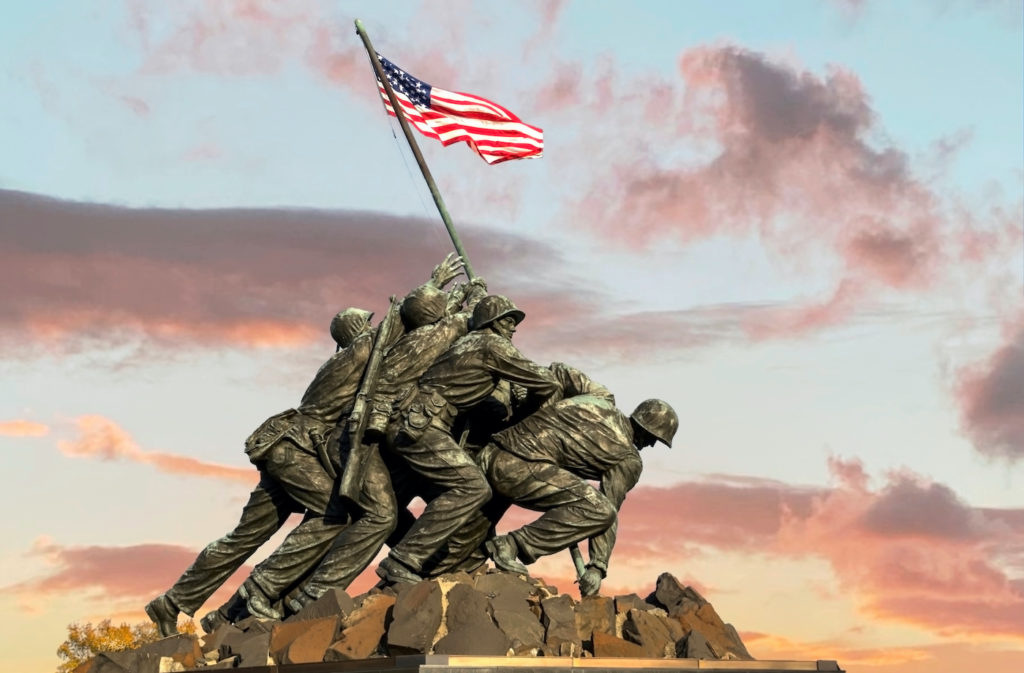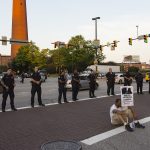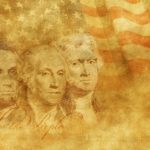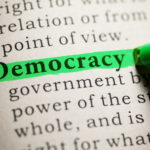Note from the editors: The following are edited remarks Susan Hanssen delivered at the Intercollegiate Studies Institute’s Gala for Western Civilization on October 13, 2022.
“In the middle of this life of ours, I awoke to find myself in a dark forest, and the straightforward path was utterly smeared out.” Nel mezzo del cammin di nostra vita, mi ritrovai per una selva oscura, che la diritta via era smarrita. It is possible that we today, as conservatives, find ourselves in a dark forest with regard to patriotism. “In the middle of this life of ours,” says Dante as he begins his voyage of discovery, “I awoke to find myself in a dark forest.” The straightforward path of patriotism has been utterly smeared out, che la diritta via era smaritta.
We can look back from this moment in our nation’s history to another difficult moment in our nation’s history: the secession winter of 1860–1861. During this period, Abraham Lincoln appealed to something deep in the soul. He appealed to America’s patriotism. He describes patriotism as “mystic chords of memory, stretching from every battle field and patriot grave to every living heart and hearthstone.”
After four years of war, over 600,000 dead, and the assassination of Lincoln himself, the American poet James Russell Lowell wrote that Lincoln had saved for us our country, had saved for us the beloved object of our patriotism. Lowell describes patriotism as a virtue, as an “ineffable sentiment made up of memory and hope, of instinct and tradition, which swells every man’s heart and shapes his thought, though perhaps never present to his consciousness,” a source of both “courage and security,” an attachment to the “harvest of priceless associations” that makes our land our home, rather than “common earth and nothing more.”
Start your day with Public Discourse
Sign up and get our daily essays sent straight to your inbox.We are living through a crisis in which the cultural fabric of our nation, of our civilization is being rent. For fifty years or more, we have sustained relentless attacks aimed at destroying the most fundamental bonds of society: the honor due to God, Father, and Country. Since the 1960s and even earlier, teachers in our universities and schools have embraced anti-Americanism: “Hey, hey, ho, ho, Western Civ has got to go!”
But Western Civilization is the fabric that makes up the rich tapestry of American identity. In his 1974 classic The Roots of American Order, Russell Kirk showed how the threads of four great Cultural Heritage Cities were woven into the fabric of American society. The moral, linguistic, cultural, religious, artistic, economic, and political heritage of Jerusalem, Athens, Rome, and London created the rich civilizational soil from which American life grew. Russell Kirk understood that if Americans were going to sustain their national patriotism, they needed to deepen it into a capacious civilizational patriotism. But where does American patriotism go from there? And how can we reclaim it from ideologues who seek to dilute American culture until it becomes unrecognizable to young people?
The moral, linguistic, cultural, religious, artistic, economic, and political heritage of Jerusalem, Athens, Rome, and London created the rich civilizational soil from which American life grew
English Identity
In my academic work, I’ve looked to England as a model for how to sustain patriotism. Twenty years ago, I was writing about G. K. Chesterton’s efforts to recover English national identity at the beginning of the twentieth century, at the time of the two World Wars. The dissertation would be entitled “Discovering England.” Under the accumulated layers of centuries of history, Chesterton worked to recover a sense of “merrie olde England,” of Englishness as a part of Christendom, a patriotism not for abstractions and universalist humanitarian slogans, but a genuine rootedness.
I remember meeting the Chesterton scholar Joseph Pearce for the first time at a pub in Oxford and getting into a good old-fashioned heated argument. I was planning at the time to entitle my dissertation “Inventing England”—the idea of “inventing national identities” was all the intellectual fashion at the time—Inventing Human Rights by Lynn Hunt, Inventing America by Garry Wills—it was the postmodern notion that all identities are “invented” identities. It was true that Chesterton had to excavate beneath the layers of the British Empire, Great Britain, and the United Kingdom to dig up the old hobbit-like physiognomy of English identity, but Joseph Pearce insisted that Chesterton “invented” nothing about the English; that the English really were like hobbits rooted in the soil and not uprooted moderns in business suits and top hats. Chesterton discovered England, he didn’t invent England.
But even as an Anglophile graduate student studying in the British Library in London, immersing myself in my favorite period—the dark days when Winston Churchill battled Mordor with nothing but hobbits and Spitfires—no matter how charmed I was by English national identity and patriotism, it made me more than ever intrigued by American national identity and patriotism.
Making American Patriots
Since then, I have been on my own voyage of discovering American national identity. Teaching American Civilization at the University of Dallas—in the great state of Texas, the land of the free—during the academic year, and teaching Western Civilization on Dallas’s splendid Rome campus during the summers, I have been free—in a way that very few tenured academics are free these days—to excavate the layers of American national and religious identity. I have discovered that ideologies prey on uprooted and rootless moderns. Ideologies prey on those who have no roots in family, church, or nation. Conservatives must be patriots—it is not possible to be a conservative and say that there is nothing valuable or worth preserving from your own nation’s cultural tradition. The desire to fight for the integrity of your own country has got to come from a visceral love for your country or else it will not seem worth any struggle against its corruption.
Is American patriotism only an abstract patriotism for a political regime, merely an allegiance to certain universal political ideals? Or have the ideals and institutions molded a particular kind of American soul? Isn’t American patriotism a love for the people in whom those ideals are made incarnate, a people shaped by language and landscape?
American patriotism is not only the aspiration to be “a nation conceived in liberty and dedicated to the proposition that all men are created equal,” but also the memory of “those who here gave their lives that that nation might live.” As Plato said, the city shapes the soul, and the souls in turn shape the city. And the delightful, wonderful, unutterable naïveté, the blustering and boisterous confidence that the “Laws of Nature and of Nature’s God” are “self-evident truths”—visible to every human person because they are all equally created in the Image and Likeness of God—has indeed forged a peculiar American soul.
But what are the “characteristic fragments” of American culture and history that every young American should be familiar with? Our young people live in a patriotic desert—they live in sci-fi and fantasy literature and superhero movies, in other worlds among creatures with other powers. They live in an online world abstracted from history: the world of Twitter, Instagram, and TikTok.
Isn’t American patriotism a love for the people in whom those ideals are made incarnate, a people shaped by language and landscape?
There was a time when The Sound of Music and Fiddler on the Roof told the story of America: when Americans understood that America had been a refuge for immigrants fleeing authoritarian, socialist, Communist regimes in Germany, Russia, Cuba, and Vietnam. There was a time when Little House on the Prairie and Saving Private Ryan filled the imagination: when the rugged virtues and work ethic of Ma and Pa carving out a homestead on the frontier and the courage of twenty-year-olds under fire filled Americans with an honorable pride. There was a time when “Were You There When They Crucified My Lord,” “By the Rivers of Babylon,” and “Auld Lang Syne” were our common musical heritage: when the fiddle met the banjo, and the heartrending songs of slaves on southern plantations mingled with the Scots-Irish nostalgia for the old country. Or if you are not charmed by the American legend, what about the many true American stories of heroism during our wars?
These are mere fragments, but they are characteristic fragments. I am sure each of us possesses inside a store of such fragments that we would wish to pass on to young people, to give them a sense of a home worth living and dying for.
American culture is despised by our elites; but worse, American culture is utterly unknown to our young people. Without the “priceless associations” that James Russell Lowell referred to, without cultural memory and historical imagination, America would be “common earth and nothing more.” We need many different units in the fight for American culture—we desperately need the valiant news sources that warn us daily, hourly of the signs of destruction all around us: the radicalization of the Department of Justice and the targeting of patriotic Americans, the lunacy of our “medical health” professions under the craze of transgenderism, the steady drumbeat of cancel culture against anyone who speaks the blandest common sense.
But we also, rather desperately, need groups who are trying to pass on to the next generation the traditions that continue to inspire patriotism for the vital remnants of American culture that remain worth defending. We need institutions committed to instilling in young people a capacious national American patriotism rooted in a love for the Judeo-Christian, Greco-Roman tradition.
Without patriotism, the young will have no will to fight. Their hearts will not bleed at the sight of the moral and political corruption if they know nothing of America’s greatness.














